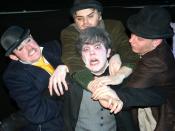One of the most unusual parts of the play is, not surprisingly, one of the most important parts. This is Lucky's 'speech', which is given near the middle of the play. It's importance is signalled not only by its content, but by its style and structure as well. While any other line in the play is important, if for no other reason, just for being there, Lucky's speech is utterly significant. In general, the other lines are short, limiting themselves to a sentence or just a few curt words. While Lucky's speech is also one sentence, it can be considered so only becuase it has one period. It takes up nearly three pages of the play in itself.
Though the sheer length of the speech is peculiar alone, the actual text is exceptionally bizarre. It is a seemingly senseless arabesque thoughts, nonsense and symbols; reminiscent of 'train-of-thought'-like style, associated largely with Beckett's contemporary James Joyce, and perhaps even more so with the style of a later author and thinker, the somtimes surreal William S.
Burroughs and the 'cut-up' method he employed. This deconstructed style could be argued to be either inferior to traditional language structure in its confusion, or superior in its sense of purity, creating images and sensations, not restriciting the reader to mere words.
Lucky's speech is preceded by Vladimir reqesting Pozzo make Lucky speak. Pozzo insits that Lucky needs his hat to do so. After Lucky has his hat placed upon his head, Pozzo orders him to 'Think!' Lucky begins, while the others create a sense confusion: Pozzo becomes increasingly appalled by Lucky's words, while Vladimir and Estragon waiver between attentiveness and disgusted pain.
The speech is reflective of the rest of the play (and transitively, life itself), and therefore open to interpretation. In fact, Beckett...



Nicely done!
I'd say that Teenslut has the start of a really good critical essay - I'm not sure why it's in the European History folder, but that's different.
I think this essay would be marvelous if someone fleshed it out a little further - who is Lucky? What has the plot been before Lucky's speech? Why does it matter? - Answering questions like that would really improve this piece, which for now is really skimming the surface of a very deep pool.
0 out of 0 people found this comment useful.